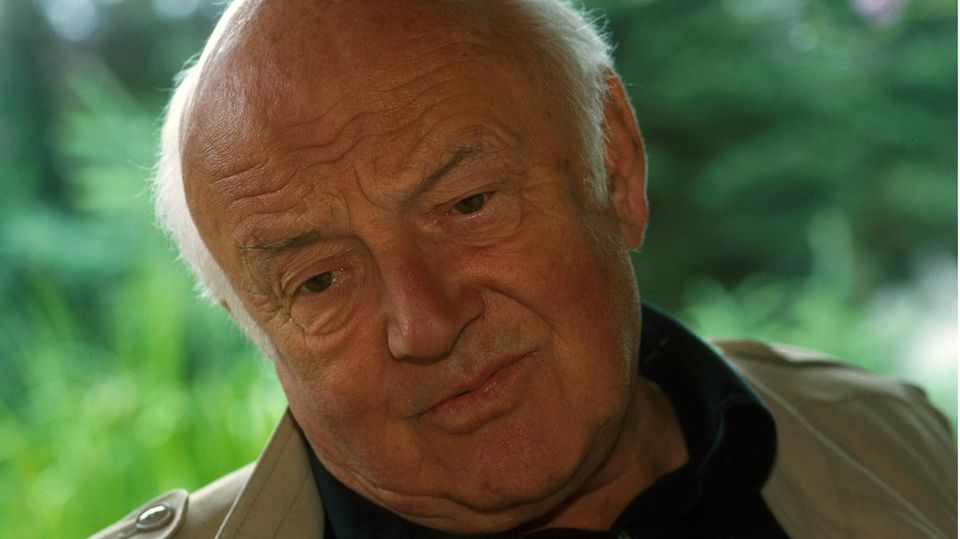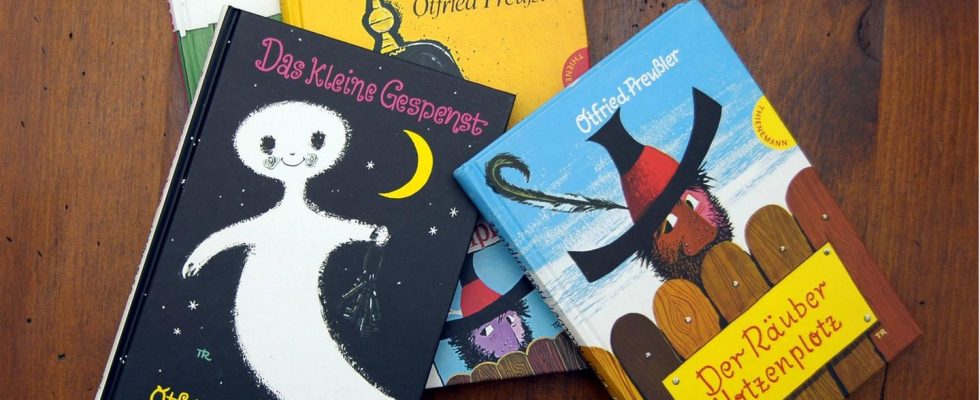Ottfried Preussler
The creator of “Robber Hotzenplotz” would have turned 100 today – he was keeping a secret from the war
Ottfried Preußler became world famous with children’s book classics such as “The Little Ghost” or “Räuber Hotzenplotz”.
© Schöning / Imago Images
As children, we loved Ottfried Preußler’s books – they will probably always remain wonderful classics. But we didn’t know much about the author. Also because he himself remained silent.
What do you do with school children who prefer playing outside to reading and are afraid of thick books? In my case, the following method worked: When I was, in my own opinion, “too big” for my parents to read to me before going to bed, I was given radio play records with stories by Ottfried Preußler.
From then on, my little sister and I sat spellbound in front of the record player and listened to what adventures the “Little Witch”, the “Little Ghost” or “Kasperl and Seppel” had to go through in the “Räuber Hotzenplotz”. I can still hear the voices of the stories today. Well-known actors and actresses read the adventures – at times I knew some of the passages by heart.
And that was exactly a problem at the same time – because compared to the books, these records were greatly abbreviated versions of the stories that Preußler had invented. Relatively quickly I knew everything and knew by heart what was coming next in the audio story.
So I suspected that there might be more exciting things to discover in the books. After all, they were pretty fat.
Having become so curious, I dared to read a real book: “Robber Hotzenplotz”. It seemed so immense that I thought I would struggle through the many pages for years.
Ottfried Preußler became famous with “Little Aquarius”.
That only turned into a few days. In my first years at school in the late 70s and early 80s I read almost all of Ottfried Preußler’s books. Except for “Little Aquarius”. I found the cover boring.
This probably puts me at odds with most other Preußler fans. Or the book found its readers despite the cover. That adventure, which appeared in 1956, was considered Preußler’s first book publication for decades and made the author, born on October 20, 1923, world famous. It was the beginning of an extraordinary literary success story. To date, his works have been translated into more than 50 languages. Preußler has sold millions of books and inspired countless children of many generations. The writer would have turned 100 this Friday.

Ottfried Preußler was born on October 20, 1923 in what was then the Sudetenland. The photo was taken in the late 90s. Preußler moved to Bavaria after the war.
© Waldmüller / Imago Images
His stories are often a mix of adventure and a bit of magic. That magical part, as it is explained today in articles about the author, comes from his family history: born and raised in northern Bohemia, in what was then Sudetenland and today’s Czech Republic, he grew up with a whole repertoire of fairy tales and stories from the region: with Slavic legends, stories and myths, some passed down orally. He was able to draw from it throughout his life, according to articles about the work of Ottfried Preußler. As a child he loved stories and discovered his enthusiasm for writing as a teenager.
That almost sounds a bit too fairytale-like – and it is. Because Preußler’s biography also has elements that the author did not talk about, especially not when he had become an absolute children’s book star in West Germany.
Hitler Youth novel from the 1940s
It was only after his death in 2013 that it became known to a wider public that his first published book was not “The Little Aquarius”, but a novel called “Harvest Camp Geyer”. The literary historian Peter Becher reported on this in an article in 2015. The novel was published in 1943 or 1944 by the Berlin publisher Junge Generation. It is described as a typical Hitler Youth novel, where boys – or “pimps” – had adventures in the countryside. According to reports, such stories were very popular at the time.
Preußler, who experienced the German-Czech nationality conflict in his homeland, the Sudetenland, in the 1930s, himself belonged to an organization at a young age that was later transferred to the Hitler Youth. His father changed the family name Syrowatka in 1941 to the much more German-sounding Preußler. At that time, there was widespread enthusiasm among Germans in the Sudetenland for Adolf Hitler and his “home to the Reich” slogans.
Pictures of the day
Heavy surf
Preussler himself joined the Wehrmacht at the age of 18 and went to the Eastern Front at the age of 19. He survived five years of Soviet captivity and moved to Bavaria after the war.
His old home no longer existed; the Germans had been expelled from there after the world war started by Nazi Germany. From then on, Preußler’s birthplace was no longer called Reichenberg, but Liberec. But part of his old homeland lived on in his books – the literary motifs, the witches and robbers and magical creatures.
Revanchist tones were never heard from Preußler after the war. He was not one of the displaced people who would have preferred to reconquer the “eastern territories”. Quite the opposite. His enthusiasm for Czech culture can be seen in his work, not just in his own novels. It was Preußler who made “Mikesch the Cat” famous in Germany when he retold the work of the Czech author Josef Lada from the 1930s as a German children’s book.
It’s a bit like the shortened records and books: the person Ottfried Preußler is more than the creator of beautiful children’s books and his biography is much more complex. The author died on February 18, 2013 in Bavaria. Generations of children have grown up with his stories, and many more are likely to follow.
Sources: ORF“Welt.de“, “Preussler.de about “Geyer harvest camp“, “Preussler.de“



